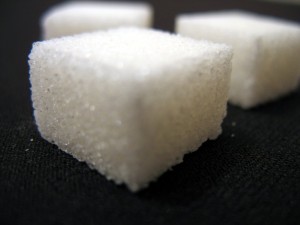A spoonful of sugar may have helped the medicine go down when Julie Andrews sang the song, but fast forward to the 21st century and sugar isn't looking so sweet. Today in a provocative commentary in the journal Nature, researchers argue that sugar is so toxic to our bodies, it should be regulated in the same way alcohol and tobacco are.
The three writers, all from UC San Francisco, say that every country that has adopted the Western diet, with its hallmark of highly-processed food, has seen rising rates of obesity and the diseases that go with it, such as heart disease and diabetes. But, in a turn, they argue against blaming obesity itself. "Obesity is not the cause," they write, "rather, it is a marker for metabolic dysfunction, which is even more prevalent." Metabolic syndrome leads to diabetes, high blood pressure, heart disease, fatty liver disease and even cancer, they say.
And the culprit, they insist, is sugar, particularly its fructose component. "Fructose, which is the sweet part of sugar," said co-author Robert Lustig in an interview, "is toxic beyond its caloric equivalent." People often refer to sugar as "empty calories," but they are far from that, the writers say. "A growing body of scientific evidence shows that fructose can trigger processes that lead to liver toxicity and a host of other chronic diseases. A little is not a problem, but a lot kills slowly."
At this point I was getting a sinking feeling. Maybe it's the way smokers felt when the bad news started coming out about tobacco in the late 50s and early 60s.
Sugar consumption has tripled worldwide in the last 50 years, the writers assert, and they say to combat the myriad health problems we face today, regulation is necessary. Sugar meets four criteria that merit government action. "The first in unavoidability," Lustig said, "it's everywhere. The second is toxicity beyond its calories. The third is potential for abuse because it activates the same areas of the brain as alcohol and tobacco creating a cycle of consumption and disease, and the fourth is negative impact on society." The negative impact on society is largely seen through high health care costs because of the many diseases associated with high sugar consumption.
